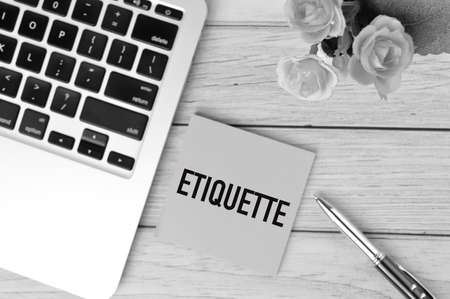
In a consultancy firm, the HR roles are essential to ensuring the smooth functioning of the firms internal operations and supporting the consultants who provide services to clients. For ensuring smooth functioning of the firm’s internal operation ensuring etiquette guidelines is also part of HR role. Remember that office etiquette can vary from one workplace to another, so it's important to observe the behavior of your colleagues and understand the norms of your specific workplace. Being mindful of these etiquette guidelines will contribute to a harmonious and productive work environment. Office manners and etiquette refer to the professional and courteous behaviors expected of individuals in a workplace setting. Proper office etiquette helps create a positive and respectful work environment, fosters effective communication, and enhances professional relationships.
Positive office culture is largely reliant on good manners and etiquette. Basic manners in the corporate environment are what are generally referred to as office etiquette. When colleagues interact respectfully, share credit, and communicate openly, they are more likely to work well together and achieve common goals. It is significant because it reduces workplace stress and workplace conflict, and it creates mutually respectful atmosphere. When you see someone new instead of avoiding him/her you can introduce yourself and try to make them feel comfortable. Greet your colleagues with a friendly demeanor. A simple "good morning" or a "smile" can go a long way towards creating a positive atmosphere.
Etiquette guidelines establish clear expectations for behavior, which helps avoid pointless disagreements. When everyone understands how to communicate and interact respectfully , misunderstandings and tensions are less likely to arise. A respectful and positive work environment can lead to improved productivity. When employees are focused on their tasks rather than dealing with negative interactions, they can accomplish more in less time. Respecting your seniors and behaving good with your juniors is also a part of office manners and etiquette. Sometimes, people may not be as formal as they once were in office and even through still, they want their coworkers to treat them with respect and courtesy. People need to get aware of it, “they may get in return, what they give”! Respecting others, avoiding misbehave as much as can is necessary to maintaining a positive office culture. Here are some key office manners and etiquette to keep in mind, active listening, collaboration and teamwork, respect diversity. Besides respecting the personal space of your coworkers is also a part of etiquette. Knock on closed doors before entering and avoid hovering around someone workspace without permission. Use respectful and professional language when communicating with colleagues, both in person and in written communication (emails, messages, etc.). Avoid using slang, jargon, or offensive language. Treat all colleagues with respect and inclusivity, regardless of their background, ethnicity, gender, or beliefs. Clean up after yourself in shared spaces like the kitchen or break room. Respect others food and belongings. Respect designated break times and lunch hours. If you need to speak with a coworker during their break, ask if it's a convenient time.
Not only behaving good is etiquette but also arrive at the office on time, while attending any important meeting stop gossiping with your side partners, respecting office rules and regulations are a part of office manners. Being punctual shows respect for other peoples time and helps maintain the flow of work. Even though someone is less knowledgeable than you, instead of mocking them helps them to grow. A respectful environment contributes to employees well-being. Feeling valued and respected at work has positive effects on mental and emotional health, leading to higher job satisfaction and lower stress levels.
Demonstrating good etiquette can contribute to career growth. Professionals who display proper manners are often seen as dependable, trustworthy, and capable of handling leadership roles. Etiquette is an integral part of shaping company culture. When etiquette is upheld by both leadership and employees, it sets the tone for the type of workplace the organization wants to be.
Etiquette doesn't apply only to interactions within the company; it extends to customer and client interactions as well. Maintaining professional and respectful behavior when dealing with external parties reflects positively on the organization. Besides, etiquette helps build strong, long-lasting relationships among colleagues. This can lead to a stable and supportive work environment that contributes to overall career satisfaction.
In essence, etiquette guidelines provide a framework for how individuals interact, communicate, and collaborate in a professional setting. When these guidelines are upheld, they create a positive cycle where respect, understanding, and productivity reinforce each other, leading to a workplace that is both harmonious and conducive to success.
Share this page via

